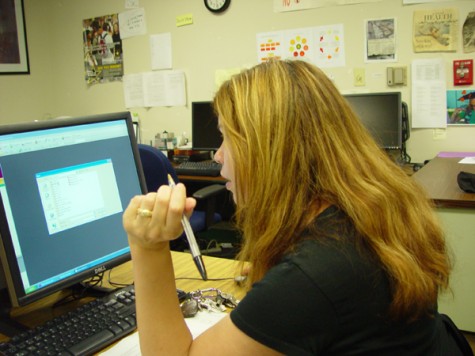Latin American people, landscapes and revolutions were captured in a dramatic photographic “poem” presented by retiring Latin American Studies Professor Carlos Ugalde in Kreider Hall Thursday.
The expressive faces of old and young people from countries south of our border, juxtaposed with exquisite landscapes, brightly colored buildings and scenes from various revolutions of the 20th Century were the culmination of sabbatical leaves the professor took during his more than 20 years on the faculty.
The slide presentation was accompanied by gentle strains of Latin guitar and livelier pieces, from mariachi to Beethoven.
“Nuestra America” the 20-minute audio and visual poem, was based on 30 years of his travels – documenting photographically the social, political and cultural life of Latin America.
Krieder Hall was packed for the event, as the aisles flooded with people who couldn’t find seats. Mike Eberts, the mass communications professor who organizes the science lecture series, introduced Lorena Martinez, an A.L.A.S. (Association of Latin American Students) member, who in turn introduced the retiring Ugalde.
Martinez described Ugalde as one of the most dedicated professors at GCC, alluding to his travels of more than 19 countries in Latin America.
During his time here at Glendale, the white-bearded Ugalde has witnessed and documented the historical human struggle of people south of the border, including the Zapatista movement of the 1990s.
The slide show included pictures of landscapes, catholic images, personalities, social conditions, among other visuals of the Latin American culture that were accompanied with an array of Latin music as well as Beethoven’s Ninth Symphony, including “Ode to Joy,” which was written for the French Revolution.
The three sabbaticals Ugalde took throughout his career enabled him to continue his photographical documentation of his travels and events of the time.
He documented the arrival of the Comandancia of the EZLN, the commemoration of the 30th year of the fall of Ernesto “Che” Guevara, the visit by Pope John Paul II and the presidential inauguration of Evo Morales in Bolivia among others.
Ugalde has been involved in various campus exhibitions, as well as exhibitions throughout Mexico, Los Angeles and Cuba, among other places, where his photographic documentation has been displayed.
As the lecture continued, Ugalde began to thank everyone and expressed the way he felt in his closing speech before retiring and leaving Glendale college.
“Not even in my wildest dreams did I think I would be alive to be before you today.”
Ugalde joked and said he always thought he would end up blown up in Central America during the 1980s.
Ugalde spoke of his appreciation, gratitude, and love of Glendale College, and his gratitude for having worked and been part of the faculty in Latin American Studies.
He said that he would speak highly of GCC for allowing academic freedom from certain conservative sectors on campus and of the community.
“It’s one of the most humanistic professions,” said Ugalde.
He said that he has always spoken highly of GCC “for it’s commitment to excellence and the colleagues that gave me the confidence and support to teach precisely what I prepared and continuously was able to expand, travel, document, and update through my numerous personal travels.”
Documenting the daily Latin American drama served to enrich and validate the historical analysis, he said.
Ugalde said he spoke highly of GCC in the numerous presentation and academic conferences which he participated throughout the United States “from the tip of the southern glaciers in America Latina, in the mist of the formidable Andes, in the valleys and jungles of Central America, in the tropics of the Caribbean to the most remote in the Peruvian Andes.”
He talked about embracing all of his colleagues and said he appreciated the maintenance staff, the cafeteria staff, the administration staff, and the college police for the many times they had to jump cable his battery and turn off his car lights.
He also included the art and theater departments, business office, and the bookstore in his appreciation.
“Continue to defend academic freedom and student activism, theory and practice,” said Ugalde, directing his statement to his colleagues ns in the social science department.
“I leave with the greatest memories working with the A.L.A.S. I wish the very best to the future of A.L.A.S. and may it continue to provide intellectual discourse, an alternative analysis, and promote international solidarity, which was one the pillars of the Association of Latin American Students,” said Ugalde.
Ugalde said he would greatly miss GCC but is satisfied for the “great humanistic experience.”
With tears in her eyes Joy Hernandez, 20, said, “I think it’s a big loss. He’s taught a lot of my counselors and he’s made such a big impact on the school, on what is taught here, especially on Latin American countries and Latin American people.”
“He was a very humanistic person. He wanted all of us to know about the situations in Latin America. he’s also very humorous,” said Ana Maria Mejia, former A.L.A.S. member and a UCLA transfer.

